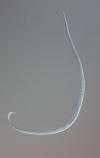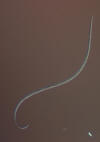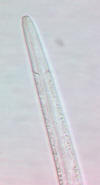


Revised 05/28/25
 |
 |
 |
| Amphidelidae (L=1.3 mm); Domes Gardens, UC Davis. Photos by Anna Ruth Crittenden | Amphidelidae; esophageal region and amphid apertures | |
Amphidelidae:
Etymology: refers to conspicuous amphids.
Key to the genera of Amphidelidae:
| 1 | a | Cuticle with conspicuous longitudinal ridges; spicules slender and arcuate; gubernaculum present | Cristamphidelus Siddiqi & Vinciguerra, 1991 |
| b | Cuticle without longitudinal ridges; spicules short gubernaculum absent | 2 | |
| 2 | a | Amphid apertures large, oval, long axis of aperture longitudinal | Megamphidelus Siddiqi, 1993 |
| b | Amphid apertures not enlarged, transverse, oval or slit-like | 3 | |
| 3 | a | Vulva open, vagina thick, female generally diovarial | 4 |
| b | Vulva closed vagina thin, female monovarial | 5 | |
| 4 | a | Vaginal walls infolded | Metamphidelus Clausi & Vinciguerra, 1995 |
| b | Vaginal walls not infolded | Amphidelus Thorne, 1939 | |
| 5 | a | Head asymmetrical with inner sclerotization; oral opening subterminal | Scleralaimus Siddiqi, 1993 |
| b | Head symmetrical without sclerotization; oral opening terminal | 6 | |
| 6 | a | Vulval lips sclerotized; spicules simple | Scleramphidelus Clausi & Vinciguerra, 1995 |
| b | Vulval lips not sclerotized; spicules with central line | 7 | |
| 7 | a | Female monovarial, prodelphic | Etamphidelus Andrássy, 1977 |
| b | Female monovarial, opisthodelphic or diovarial, amphidelphic | 8 | |
| 8 | a | Amphid apertures large, oval to round, close to head | Laxamphidelus Siddiqi, 1993 |
| b | Amphid apertures narrow, slit-like, more than 3 lip widths behind head | 9 | |
| 9 | a | Amphids offset from each other, esophagus about 1/3 body length | Postamphidelus Siddiqi, 1993 |
| b | Amphids opposite each other, esophagus about 1/4 body length | 10 | |
| 10 | a | Female diovarial, amphidelphic; amphids only conspicuous in male | Caviputa Siddiqi, 1993 |
| b | Female monovarial, opisthodelphic; amphids conspicuous in both sexes | Paramphidelus Andrássy, 1977 |
Andrássy, 2009, Free-living nematodes of Hungary. Hungarian Natural History Museum, Budapest
Choudhary M., Jairajpuri M.S. (2010) Evolutionary trends in soil-inhabiting alaimid nematodes. In: Sharma V.P. (eds) Nature at Work: Ongoing Saga of Evolution. Springer, New Delhi
Want more information about nematodes? Go to Nemaplex Main Menu.